
New Report Highlights the Impact of Family Dynamics on Mental Well-Being of Indian Youth
A new report from the Sapien Labs Centre for Human Brain and Mind at Krea University, India, reveals the significant impact of family dynamics on the mental well-being of young adults in India. The research indicates that closer relationships with family members are linked to higher levels of mental well-being, improved social self, and better cognitive functioning.
The report uncovers a generational decline in family closeness, with younger generations reporting less family intimacy compared to older ones. This trend is notably sharper among English-speaking respondents, who generally have higher income levels, compared to Hindi-speaking respondents with lower income levels.
Young adults who responded in Hindi reported substantially better mental well-being than their wealthier, English-speaking peers. Specifically, young adults with a family income of 1 lakh or less but close family ties had better mental well-being than those with a family income of 10 lakhs or more who were not close to their families.
Dr. Shailender Swaminathan, Director of the Sapien Labs Centre for Human Brain and Mind, emphasized the importance of family closeness over income levels for mental well-being. "While increasing income levels is crucial, our findings highlight that family closeness plays an outsized role in contributing to mental wellbeing among the youth. The differences between language groups point to a generational decline in family closeness that may be cultural in nature and to the potential negative consequences of trading off family closeness for income. Acknowledging and understanding the possible role of culture (language) and the environment on the strength of family relationships may be key to fully leveraging the potential of India's younger generation," he said.
The report builds on the Centre’s previous research, underscoring the need to identify risk factors for mental health to inform preventive strategies. These strategies could be implemented by parents, schools, and policymakers to better support the mental well-being of young adults.
The findings are based on data from the Global Mind Project, which surveyed 62,832 respondents across 36 states and Union Territories between January 2022 and August 2023.
The Sapien Labs Centre for the Human Brain and Mind in India, a collaboration between Sapien Labs (USA) and Krea University, focuses on research and education related to the human brain and mind. The Centre aims to extend its research beyond English-speaking participants to include other language groups. Future studies will explore the impact of additional risk factors, such as processed food consumption, exercise, family relationships, and smartphone use, on the mental well-being of adolescents and youth.